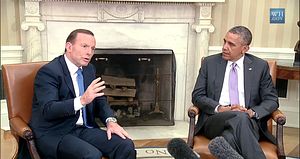Australian Prime Minster Tony Abbott met with U.S. President Barack Obama at the White House yesterday. After their meeting, Obama made the surprise announcement that the U.S. and Australia have reached “additional agreements around force posture postures that will enhance the bilateral cooperation between our militaries and give us additional reach throughout this very important part of the world.” The new Force Posture Agreement comes in addition to a 2011 deal that allows for 2,500 Marines to be deployed on a rotational basis at Darwin in northern Australia.
Neither Obama nor Abbott expanded on the specifics of the new Force Posture Agreement, but The Australian reported that the new deal could increase the number of U.S. marines rotating through Darwin as well as possibly opening up an Australian port for access by U.S. destroyers.
News of an increased U.S. military presence in the Asia-Pacific usually sparks condemnation from China, as Beijing sees the U.S. “rebalance to Asia” as a thinly veiled cover for containment. In the wake of the 2011 announcement that U.S. Marines would be coming to Darwin, China’s Foreign Ministry questioned “whether strengthening and expanding military alliance is appropriate.” The Global Times also warned that “Australia itself will be caught in the crossfire” if Australian military bases were used by the U.S. to “harm Chinese interests.”
This time, the response has been more upbeat. A Foreign Ministry spokesperson emphasized that “the Asia-Pacific region belongs to all, and it is in the common interests of various parties that the region maintains peace, stability and prosperity.” Xinhua republished the quote in a short article titled “China hopeful on U.S. marine deployment in Australia.” Other Chinese media reports emphasized Australia’s strong economic relations with China, including promising progress in negotiations over a FTA. There was an overall consensus that Abbott was decidedly more friendly toward China than many previous Australian prime ministers, making increased U.S.-Australia cooperation less threatening from Beijing’s perspective.
That Australia could offer more military access to the U.S. without sparking Chinese ire is a testimony to Canberra’s skill in balancing its important security alliance with Washington with the need for a positive relationship with Beijing. It’s a tricky needle to thread, but Australia’s approach seems to be working.
In their joint remarks, both Abbott and Obama spoke glowingly about the U.S.-Australia alliance. “We don’t have a better friend in the world, as well as the Asia Pacific region, than Australia,” Obama said. For his part, Abbott promised that “Australia will be an utterly dependable ally of the United States.”
However, in comments to Australian press afterwards, Abbott moved away from a narrow focus on the U.S.-Australian alliance. Instead, he emphasized that the entire region will benefit from an increased U.S. military presence in Australia. “This gives us the opportunity not just for Australian and U.S. forces to train together in our north, but for our regional partners to train together with the United States,” Abbott said, noting that there will be two trilateral Australian-U.S.-Chinese military exercises later this year.
Abbott’s enthusiasm for increased cooperation with China, particularly a free-trade agreement, has helped convince Beijing that Australia is sincere when it says it welcomes China’s rise. In addition, China’s positive relationship with Australia (compared to constant disagreements with Japan and the Philippines) makes it easier for Beijing to accept the U.S.-Australia alliance. Media reports about Obama and Abbott’s meeting readily acknowledged the importance of the U.S. to Australia’s strategic interests. This point is easier to accept because they believe Canberra will not allow itself to be sucked into a U.S. policy of anti-China containment.
Australian outreach to China seems to have given Canberra more leeway when it does choose to criticize Beijing. Australian Defense Minister David Johnston’s remarks at the Shangri-La Dialogue made it clear that Australia shares U.S. and Japanese concerns over China’s actions in the South China Sea. However, Johnston’s remarks attracted far less attention in China than similar speeches by Shinzo Abe and Chuck Hagel. China also seems willing to overlook Abbott and Obama’s joint op-ed promising to “do more together to support the stability and security of an open, rules-based region,” an implicit dig at Beijing.

































